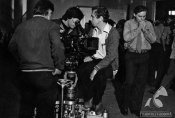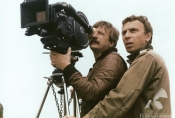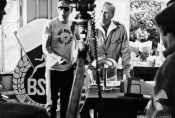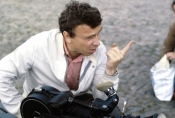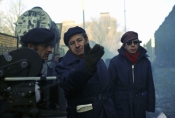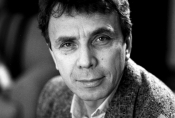Jerzy Domaradzki
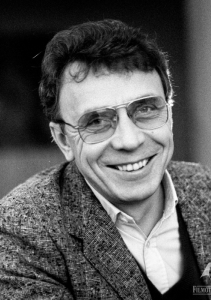
Film and theatre director, screenwriter, documentary filmmaker. Born on January 6, 1943 in Lviv. He studied at the Department of Cinematography of the State Film School in Łódź (1961–1964), later at the University of Warsaw where he graduated from sociology in 1970, and then again at the State Film School at the Directing Department (he graduated in 1974). He made his debut with a film novella Romans/Love Affair, which was a part of the film Obrazki z życia/Pictures from Life (1975) – a joint work of the debutants from "X" Film Studio (other directors included Agnieszka Holland, Feliks Falk, and Barbara Sass). A year later, he directed Zdjęcia próbne/ Screen Tests (in cooperation with Agnieszka Holland and Paweł Kedzierski) and a TV drama Długa noc poślubna/Long Wedding Night (on his own). In 1976, he started directing more TV dramas and documentaries (including the Nowojorska wieża Babel/The New York Babel Tower and Wajda). The first feature film he directed on his own was the psychological drama Bestia/The Beast (1978), based on the short story by Leo Tolstoy. In 1981, he addressed the Stalinist era in Wielki bieg/Great Run, based on the screenplay by Feliks Falk, set in the Polish reality of the Bierut presidency, which (due to censorship) was not released until 1987; it immediately earned him numerous awards, including the award at the Polish Film Festival in Gdynia and the FIPRESCI award in Montreal. His subsequent films include the drama Planeta Krawiec/The Planet ‘Tailor’ (1983), and the literary adaptations: Trzy młyny/Three Mills (1984) based on short stories by Iwaszkiewicz and Łuk Erosa/The Arc of Eros (1987) based on the text by Kaden-Bandrowski. In 1986, together with Janusz “Kuba” Morgenstern, he directed an adventure film for children Biały smok/The Legend of the White Horse.
In 1986, he left first for Canada and then for Australia, where he directed films such as Struck by Lightning (1991) and Historia Liliany/Lilian's Story (1995), a story (told through a series of flashbacks) about the life of the eponymous character, an outsider living in Sydney, who is in love with Shakespeare and who has spent 40 years in a psychiatric hospital reliving her memories. His films from the 1990s consist primarily of documentaries about emigration (Marzenia o wolności i równości/Dreams of Freedom and Equality. Professor Jerzy Zubrzycki, Grać do góry nogami/Play Upside Down) and anthropology (Szlachetny dzikus/Noble Savage). He also filmed the visit of Saint John Paul II in Australia in 1991. He is the author of the film novella Tablice/Boards, which is part of the film Solidarność, Solidarność/Solidarity, Solidarity... (2005), made on the anniversary of the events of August 1980. He returned to feature film in 2012, directing Piąta pora roku/The Fifth Season of the Year, a story of the nostalgic journey of two elderly people through contemporary Poland.
In 1994, he was elected the President of the Polish Filmmakers Association for a two-year term.
Selected filmography
-
1981
GREAT RUN
